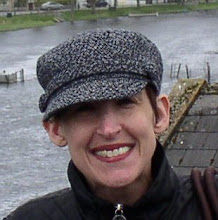I'm about to turn 35, and I've discovered that I am a derivative.
Well, that's not entirely true. I am a derivative, but I didn't just discover it.
I've always been a little bothered by the fact that I have almost no skills that, if the world became some kind of Mel Gibson apocalyptic nightmare, would be of any use. I could . . . organize everyone. I could . . . write nice letters to the avenging armies. I could . . . coordinate lovely events where everyone starved to death. You get the picture.
This fear was further codified by the book World War Z: An Oral History of the Zombie War by Max Brooks (hypnotizing book; scared me so much I had to read it all in one sitting). In World War Z, Brooks "documents" an oral history of the world post-zombie takeover. The premise is that some kind of epidemic has swept the world that kills most and turns 10% into flesh-eating people herds. Brooks imagines the horror from the perspective of people who have survived it.
In one chapter, he observes that the catastrophe has reversed traditional social hierarchies. Educated people, those who earn their livings by thinking and/or administrating, are "F class" -- they're useless. Skilled workers, those trained in blue collar occupations -- plumbers, loggers, carpenters, electricians, cooks, janitors, sanitary engineers, soldiers -- can actually physically rebuild the world, and so have greater value. In World War Z, the best you can do with F class workers is teach them to dig ditches. Seriously. And the successful characters in the book, those who have survived due to wits and sheer physical strength, have doubts about F class workers' ability to dig ditches properly.
Anyway, I think it goes without saying that a Director of Annual Fund would be an F class worker.
As Ron White says, I told you that to tell you this. We rented Julia and Julia on Friday. Lovely film. Meryl Streep transforms a woman who has been mocked, satirized and somewhat forgotten into a charming, witty tower of creativity and love. Amy Adams was also very good, albeit with fewer character challenges.
In the film (and the book, I gather) Julie cooks her way through The Art of Mastering French Cooking, writes a blog and becomes famous.
Is that what I am doing here? That is, is that what I am hoping to do here? And if so, is there value in continuing this process? Ah, the search for life's purpose.
And deep philosophical questions. Is any idea ever really new?
Then I thought, hey -- if I need something really innovative (still derivative but slightly less conventional) I could always cook my way through the 1615 culinary classic, Gervase Markham's The English Housewife. Do not mistake this for Desperate Housewives, although were this my real life I might be slightly desperate. It's an impressive but somewhat dubious list of tasks and skills required of a late-Renaissance or early-modern English housewife. The good news? A reason to cook a carb-heavy diet. The bad news? I would be required to "pot" butter (whatever that means) and scrape marrow from bones.
Hey! Now there's a skill that would be useful in the post-apocalypse.
The Last Post
-
*This Blog has moved.*
Postcards From Across the Pond is still active, but is now in a new
location. You can visit it at:
https://pcfatp.com
If you wan...
4 years ago

No comments:
Post a Comment